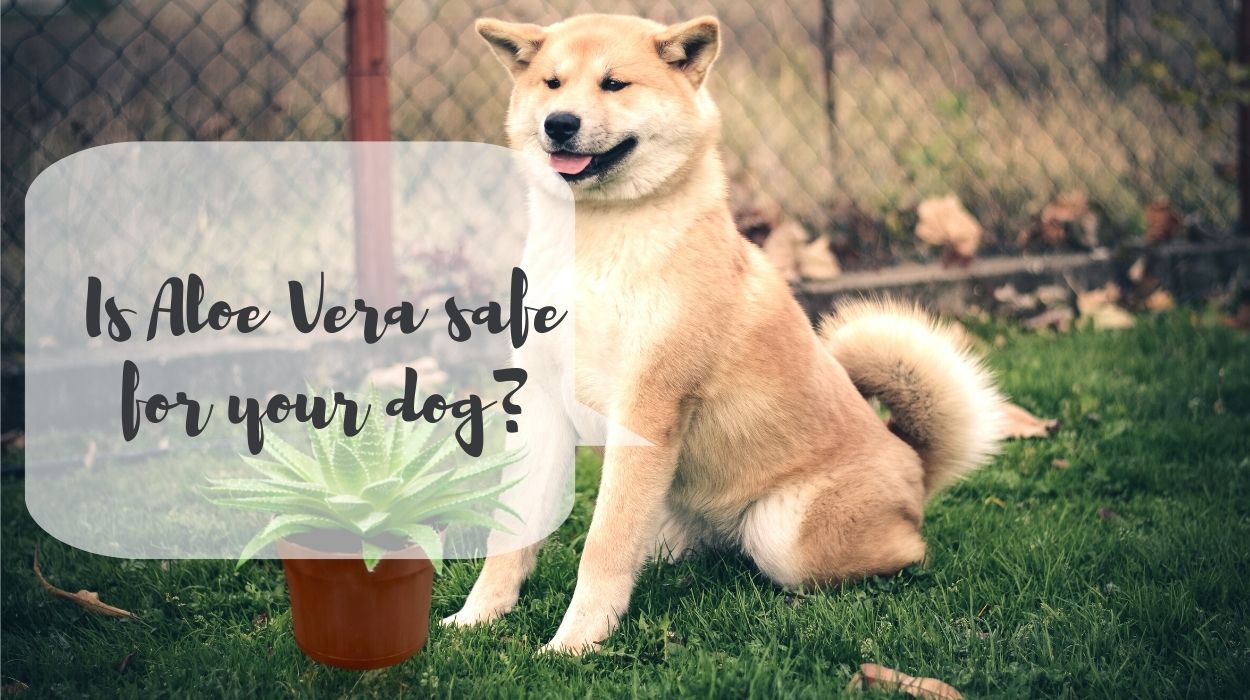Aloe vera is native to Southern Europe and Northern Africa, widely known for its medicinal benefits. It is grown in tropical climates and has many benefits, including relieving heartburn and delaying the spread of breast cancer. The succulent is famous for its many properties and can be found in almost every home.
Due to the many medicinal properties, one is expected to wonder if aloe vera benefits pets. Many questions can arise in our minds, from whether it’s beneficial for dogs or are there any risks involved.
To find the answers to all these questions and more, scroll and start reading!
Can I feed my dog aloe vera, and is it safe?

No, it is advised not to give your dog aloe vera as it contains toxins. Aloe vera leaves contain compounds like saponins and glycosides, which are toxic for pets. Though it is used often due to its medical properties, aloe vera can be toxic sometimes when eaten.
The plant produces latex, which is present in the form of a white sap, and consuming it makes the intestinal tract empty itself through vomiting or diarrhea. If your pup consumes a significant amount of the plant, it will result in vomiting, diarrhea, loss of appetite, and sometimes even tremors.
How can aloe vera benefit my pup?
Ingesting aloe vera could be harmful due to its latex, but you can use aloe gel for your pup. You could apply aloe gel to a wound on your dog’s body as it has healing properties. It also soothes itchy skin.
It has inflammatory properties and is rich in calcium, potassium, Vitamins A & C, iron, etc. There are anti-bacterial and anti-fungal properties present too.
Aloe vera can treat dry and cracked paws, and the gel is a good lubricant. You can also use the gel to heal incisions after surgery for a speedy recovery. If the gel does not contain any toxins, it could be used as a lubricating agent.
The suitable amount of aloe vera for your dog and how to use it?

Knowing the appropriate amount of aloe vera for your dog is important as its excess can be harmful. One should know the different ways to use aloe on a pup too.
Different ways of using aloe vera on your pup
The first one is internally, and you can feed your pup aloe gel moderately, as it provides digestive support. For 10lbs of body weight, feed your dog ¼ teaspoon of aloe vera gel or juice. An effective way of feeding it is to use water or bone broth to dilute the aloe vera gel or juice and mix it with your dog’s food.
Another way of using aloe vera is to apply it on wounds or itches on your dog’s body. Apply aloe vera gel twice every day for effective results and ensure that your dog doesn’t lick it.
Avoid giving puppies aloe vera. Check if your pup is allergic to aloe vera gel by using it in small quantities. Do not feed your pup aloe vera if she is pregnant.
Risks of feeding your dog aloe vera

If your dog consumes a large quantity of aloe vera, it can cause health problems. The toxins present in the plant can irritate your pup’s intestine and cause diarrhea.
There is a possibility of diarrhea, dehydration, and sometimes kidney failure due to loss of liquids. If your pup consumes a large amount of aloe vera, it can also lead to weight loss and, in some cases, body itching, irritated skin, etc.
Excessive consumption of aloe vera can cause aloe vera poisoning in dogs. It can cause stomach problems and diarrhea.
Some symptoms of aloe vera poisoning are :
- Vomiting
- Dark urine
- Tremors
- Nausea
- Diarrhea
- Abdominal pain
- Lethargy
- Drooling
Contact your vet if you doubt that your pup has consumed aloe vera or see any of these symptoms.
What to do if your pup has aloe vera poisoning?
Immediately consult a vet if you think your pup has aloe vera poisoning. The treatment could include decontaminating your pup through vomiting or gastric lavage to remove aloe vera from their stomach.
Your dog will be hydrated and stabilized using IV fluids and oxygen therapy. Sometimes, the vet will use activated charcoal to remove the aloe vera through your dog’s bowels.
Things to feed your dog instead of Aloe Vera

Many plants are safe and healthy for your pup to consume. These include:
- Bamboo: Bamboo foliage has about 22% protein, which will benefit your pup.
- Dill: Dill helps in keeping your dog’s breath fresh. It reduces gas formation in the stomach and has anti-foaming properties.
- Basil: The high levels of antioxidants and anti-inflammatory properties help reduce the risk of cancer.
- Fennel: Rich in vitamins, iron, and calcium, fennel helps with indigestion and prevents bad breath in your pup.
- Thyme: Thyme boosts your dog’s immune system and provides vitamin A, C, and K.
What should be done if my dog eats aloe vera?
Firstly, and most importantly, take your dog to the vet for checks. Try to understand the quantity of aloe vera consumed, as this will help provide effective treatment. If you notice any symptoms of aloe vera poisoning, let your vet know.
FAQs
Is it safe to use aloe vera on my pup’s itches?
Yes, aloe vera is safe for use on itchy skin. Ensure that the toxic part has been removed before use.
Can I put aloe vera on my pup’s paws?
Yes, aloe vera helps in healing dry and cracked paws. It is safe and will soothe your pup’s paws.
How suitable is aloe vera as a lubricating agent?
As long as it is 100% gel and doesn’t contain toxins, aloe vera can be an excellent natural lubricant.
Conclusion
Ingesting aloe vera is not safe for dogs. However, it can be used topically and has many health benefits including, anti-inflammatory and anti-bacterial properties. Rich in vitamins and minerals, aloe vera also helps heal and soothe wounds.
Moderation is crucial, as aloe vera can be toxic if consumed by your pup. Alternatives to aloe vera for your dog are bamboo, chamomile, basil, dill, etc. If your pup consumes the toxic part of a significant quantity of aloe vera, immediately consult a vet.
We hope you have reached the answers to all your questions. Share your thoughts down below, and thanks for reading!

Dr. Aram Baker has been with Santa Clarita Animal Hospital since 1995 and his special interests include behaviour medicine and dermatology. He graduated from the Cleveland Humanities Magnet Program in Reseda, CA and attended California State University at Northridge where he received a Bachelor’s degree in biology. He went on to pursue his Doctorate in Veterinary Medicine at the University of California at Davis. He also spent time in the zoological medicine department at U.C. Davis during his Junior and Senior years. He is dedicated to caring for all pets big or small, young or old with compassion, patience, kindness, and love.
